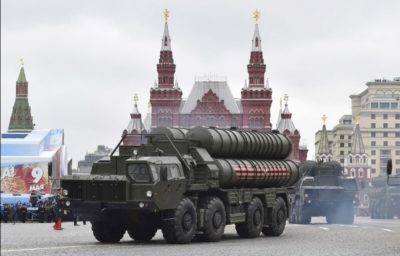Iraq Set to Buy Russian S-400 Air Defense System and Assert Its Sovereignty

Iran attacked US forces stationed at two bases in Iraq with 15 missiles on January 8th, but it does not appear missile defense systems were used to counter them. Eric Gomez, a missile defense policy analyst at the Cato Institute, said the next day, “And from the reporting I’ve seen about last night, it doesn’t appear that the US had a Patriot battery actually stationed at either of these bases.” The bases hit are Iraqi bases that house US troops, who have now been asked to leave Iraq by a parliament resolution. Iraqi officials are deeply concerned about the lack of air defenses in Iraq, in the wake of a proxy-war between Iran and the US, being waged while they sit sandwiched in the middle.
The Iraqi ambassador to Iran, Saad Jawad Qandil, said that buying the Russian anti-aircraft and anti-missile system:
“is on the table of discussions between Russia and Iraq, and it is possible for Iraq to buy this system. Iraqi-Russian relations are very good in light of Baghdad’s keenness on good relations with all neighboring countries. Iraq is keen to diversify arms sources, and we have armament contracts with Russia.”
Iraqi parliamentary security and defense committee chair Mohammad Reza announced the resumption of Baghdad’s efforts to buy the Russian air defense system of long and intermediate-range.
Alexander Sherin, the first deputy chairman of Russia’s parliament, said “They, apparently, just realized there that they are an occupied country, which does not have the right to any independent actions,” and he added, “The attack on a high-ranking military leader on their own territory without any prior notice was a clear blow to their international authority.” He was referring to the recent assassination Trump ordered of the Iraqi militia commander Abu Mahdi al-Muhandis at Baghdad airport.
In 2018 Iraq was reported in discussions with Moscow concerning buying the S-400 system. Iraqi MP Hakim Al-Zamili, head of the Iraqi parliament’s security and defense committee, had said “Iraq has the right to own cutting-edge weapons to defend its territory and air space from air attacks. Terrorism targets our country abundant in places sacred for every Iraqi. There are signs and warnings that extremists might use aircraft for attacks on those shrines, which cause lots of worries and anxiety in the country, as it was after an attack on Samarra’s holy places. So Iraq intends to possess such a system as S-400 to defend the land, shrines and air space. We are serious about that.”
The S-400 was developed to destroy drones, ballistic missiles, cruise missiles, and fighter jets. Russian media claims it is superior to French or American made alternatives, and UK military expert Richard Connolly at Birmingham University seems to agree, “The Russians and before them, the Soviet Union were always leading in missile technology. The reason for that was that the Americans and the West produced better aircraft.”
The American refusals
Even though Iraq has repeatedly asked to buy updated air defenses and weaponry from the US, they have been refused. The US has also refused to leave Iraq. Both refusals support the US position: never leave Iraq. The US will not allow Iraq to be strong and independent. To support the US position to remain, Iraq must be kept in a weak military position, so that the US is justified in remaining an occupying force. The Trumpstrategy is to keep Iran in check, regardless of the suffering of the Iraqi people who endure a proxy-war on their soil.
Lessons learned
Saddam Hussein was a US ally at one time. He bought US weapons and defenses. He had thought he was safe in invading Kuwait, as he thought he had the green-light from the US Ambassador, but was surprised to find he was under attack by the US in Operation Desert Storm in 1991. The US military had no trouble defeating him because they had all the codes to the equipment he had bought from them. The US ‘turned him off’.
Turkey insisted on buying the S-400 from Russia, even though they are a US ally and NATO member, but they wanted a non-American system of air defense. President Erdogan of Turkey is convinced that the US was instigated and participated in the July 2016 attempted coup in Turkey that left more than 250 dead and 2,000 injured and resulted in significant property damage. Erdogan’s plane was chased by an F-16 US jet.
Turkish Defence Minister Hulusi Akar told his American counterpart Mark Esper in July 2019, that buying the S-400 was “not a choice but a necessity.”
Iraq has learned from the experience of others that the US cannot be trusted. Besides Turkey, China and India have bought the S-400 system.
Thank you, now go home!
Iranian Major General Esmail Qaani, General Soleimani’s successor, has pledged his support for regional militias to be used to confront the US, which is seen as an occupying force in Iraq as well as in neighboring Syria.
Prime Minister Adel Abdul Mahdi said Wednesday it was up to the government to fulfill parliament’s decision to expel the US troops. “I request that the president, parliament and political parties nominate a new prime minister, a new government that has full authority because these difficult, complicated circumstances, especially with pulling of the troops … that needs a government with full authority so it can go forward,” he said. Abdul Mahdi asked US Secretary of State Mike Pompeo to work out a timetable for US troop withdrawal, but Pompeo refused to acknowledge the parliament resolution or the formal request from the Iraqi Prime Minister.
*
Note to readers: please click the share buttons above or below. Forward this article to your email lists. Crosspost on your blog site, internet forums. etc.
This article was originally published on Mideast Discourse.
Steven Sahiounie is a political commentator.
Featured image is from Mideast Discourse

